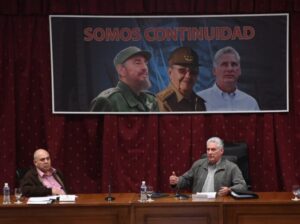Washington insists on its strategy of siege to generate hunger and desperation in Cuban families, an objective that has historically failed thanks to the resistance of the Cuban people and international solidarity
The use of a law that should have no place in contemporary international relations evidences the obstinacy of the US administration to keep intact the scaffolding of the economic, commercial and financial blockade against Cuba, ignoring the majority rejection of the international community and the clamour within the United States itself for this policy to cease.
Recently, in its eagerness for hostility and maximum pressure against the Cuban people, the White House revalidated the application of the so-called Trading with the Enemy Act (TWEA), an archaic and aggressive legal instrument approved in 1917, during the First World War.
This was denounced by the member of the Political Bureau of the Party and chancellor, Bruno Rodríguez Parrilla, through his account on the social network x, in which he pointed out that this measure is “part of the US Government’s effort to suffocate the Cuban economy”.
The Secretary of State, Marco Rubio, was the one in charge of announcing the extension of this Law for one more year, until 14th September 2026. The renewal was signed by President Donald Trump on 29th August, as recorded in the official document published on 4th September in the Federal Register.
Each year, the sitting president must endorse this extension which grants him powers to regulate exports to Cuba, allowing him to maintain and renew annually the blockade against the Island, using the TWEA as a legal basis for the Department of the Treasury’s regulations.
Furthermore, this legislation allows for the issuing of limitations to licences for exports, especially of sensitive products and maintaining strict supervision of financial and commercial transactions linked to the Greater of the Antilles.
With this decision, Washington insists on its strategy of siege to generate hunger and desperation in Cuban families, an objective that has historically failed thanks to the resistance of the Cuban people and international solidarity.




